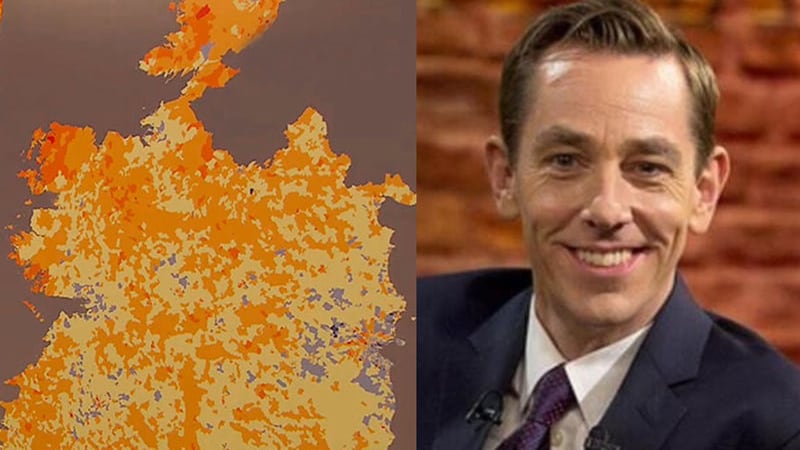THERE’S rarely a month goes by when The Irish News doesn’t carry a story in which somebody north of the border is complaining about RTÉ – the national broadcaster, at least notionally.
The charges vary from being unable to take part in a competition for which the correct answer is ‘Tyrone’, to cutting coverage of that same county’s All-Ireland semi-final clash with Kerry.
And who could forget what’s fondly remembered as the ‘decapitation of the teddy bear’ live on the Late Late Show, when in 2017 a map of Ireland had all six north-eastern counties removed, creating the impression there were sea cliffs running from just north of Ravensdale to Black Lion?
The problems, sometimes limited solely to those viewers receiving RTÉ through Sky, aren’t all the broadcaster’s fault but Montrose usually bears the brunt of outrage from public and politicians.
In the most recent case, at the time of writing, SDLP MLA Justin McNulty urged the Dublin government to step in and end the disparity of coverage on either side of the border, branding it “glaring discrimination”.
The Armagh All-Ireland winner first aired his grievances on the Claire Byrne Show on RTÉ Radio 1, a service that has intermittent FM coverage in northern counties but is fully available digitally – for which we are grateful.
The Newry and Armagh MLA, who rightly thinks it’s a “complete farce” that households in Crossmaglen are blocked from accessing content that is available to family and friends little more than 10 minutes down the road in Castleblayney, linked his appeal for equal coverage to Taoiseach Micheál Martin’s Shared Island initiative, and a what he believes is a growing desire for Irish unity. The response from the taoiseach was disappointing to say the least, with a spokesperson insisting it was a matter for the Department of Tourism, Culture, Arts, Gaeltacht, Sport and Media, which in turn told this newspaper that such operational issues were a matter for RTÉ.
The realisation that a buck was being passed only added to the sense of abandonment – similar if by no means as acute as that highlighted recently by Bernadette Devlin-McAliskey and Joe Brolly, both of whom suggested northerners felt deserted by the southern establishment during the Troubles.
It’s a theme explored by Danny Morrison in his latest book, Free Statism and The Good Old IRA. The first part of the book is new material, evolving as the former Sinn Féin publicity director wrote an introduction for his re-published 1980s’ pamphlet The Good Old IRA. Morrison argues that a partitionist mindset, what he disparagingly calls ‘Free Statism’, has existed since 1922, and remains prevalent today. It manifests itself in many ways, including in the nomenclature of the southern establishment, which increasingly refers to the 26 counties as ‘Ireland’, as separate from Northern Ireland.
The author has a wider gripe with Fianna Fáil and Fine Gael, discussed at length in the book, yet regardless his sentiments will resonate with many northerners. For the past century there’ve been countless examples of self-styled republicans and nationalists in the south paying little more than lip service to the idea of Irish unity. They talk the talk but very few match it with a corresponding forward momentum. The RTÉ issue may sound petty but to make light of it is to gravely underestimate the role state-owned broadcast media play, on both sides of the border, in shaping the respective senses of place, reinforcing the ‘physical’ borders in people’s imaginations – even where there is ‘overspill’.
Justin McNulty is correct to place northerners' full access to the national broadcaster among other Shared Island projects, where the emphasis so far has been on pooling resources to improve infrastructure and public services, rather than enhancing cultural engagement. Greater dynamism in the cross-border economy will drive north-south integration at one level, but this should be complemented with a genuine will to share aspirations.
It’s three years since the Newry & Armagh representative’s party and Fianna Fáil decided to get engaged – on the understanding they’d never marry – yet the fruits of the relationship, for various reasons, have been scarce.
Perhaps one tangible outcome of the partnership would be to help break the partitionist mentality and ensure northern viewers get full, uninterrupted access to the national broadcaster.









